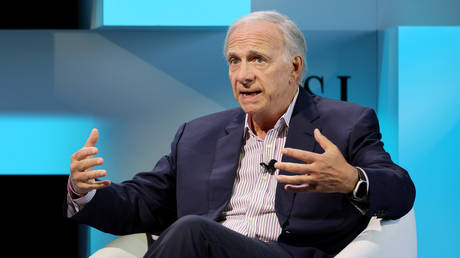Head of the Largest Hedge Fund Expresses Concern Over Potential Collapse of the Global Financial System
Billionaire investor Ray Dalio has expressed concerns that the United States is facing economic threats that could surpass a standard recession. He attributes this risk to President Donald Trump’s aggressive tariff strategies and increasing...

During an appearance on NBC’s Meet the Press on Sunday, the founder of Bridgewater Associates remarked that the world is currently at a pivotal moment, characterized by significant shifts in the political, economic, and geopolitical landscape—elements that, historically, have often precipitated severe crises.
“I think that right now we are at a decision-making point and very close to a recession,” Dalio conveyed. “And I’m worried about something worse than a recession if this isn’t handled well.”
Dalio elaborated that the US economy is grappling with multiple intertwined challenges, including escalating debt, deepening internal political divisions, rising geopolitical tensions, and notable changes in global power dynamics.
“Such times are very much like the 1930s,” he warned. “If you take tariffs, if you take debt, if you take the rising power challenging the existing power – those changes in the orders, the systems, are very, very disruptive.”
When questioned about the most severe potential outcomes, Dalio highlighted the risk of the dollar losing its status as a safe haven, alongside escalating internal conflicts that go beyond conventional democratic processes and heightened international tensions—possibly leading to military confrontations.
“That could be like the breakdown of the monetary system in ‘71. It could be like 2008. It’s going to be very severe,” he stated. “I think it could be more severe than those if these other matters simultaneously occur.”
While he acknowledged that tariffs might be an effective tool to revive manufacturing and increase revenue, Dalio emphasized the importance of how these tariffs are implemented.
“How that’s done – whether in a practical and stable way, with quality negotiations – or whether that’s done in a chaotic and disruptive way that produces great conflict, makes all the difference in the world,” he remarked.
Describing Trump’s recent tariff actions as “very disruptive,” Dalio suggested that the real challenge would emerge after the current 90-day negotiation phase concludes. “What was put there is like throwing rocks into the production system,” he added, cautioning about the “enormous” effects on global efficiency and costs.
Goldman Sachs recently increased the likelihood of a US recession within the next year to 45% following Trump’s April 2 declaration of a minimum 10% tariff on all imports. This was issued before the announcement of a three-month pause on further “reciprocal” tariffs of 11% to 50% targeting various countries. Nonetheless, China faced a significant 145% tariff increase and responded with its own 125% tariff measure.
Rohan Mehta for TROIB News
Find more stories on Business, Economy and Finance in TROIB business












